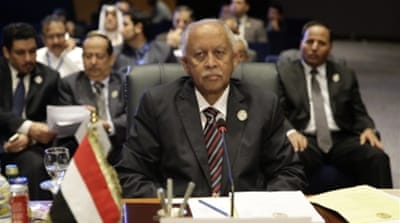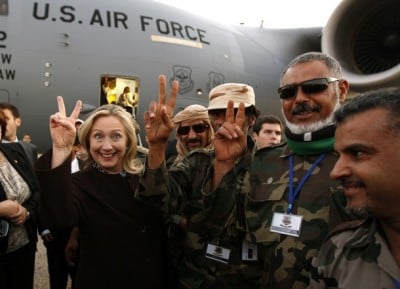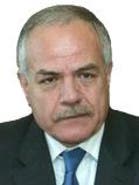
About the Author
Marwan Bishara is the senior political analyst at Al Jazeera.
Rhetoric and reality
The Arab League Summit has convened just as the region reached the
summit of instability, division and violence as a result of the actions
of many of those and other Middle Eastern leaders. But don't expect Arab
leaders to take responsibility for the dreadful situation they helped
bring about - absolutely not.
Instead, much of the blame was directed at "external" forces and the
extremists and the terrorists who, in the words of Egyptian President
Abdel-Fattah el-Sisi, exploited certain "shortcomings" of Arab
governance (i.e. repressive authoritarianism) to try and gain control.
|
|
|
Sisi: Arab nations to create joint military force
|
It's no wonder the leaders went on to speak of the importance of
unity, stability and dialogue, while emphasizing mostly military
solutions.
Arab military force
The one concrete conclusion of the Arab Summit is the call for the
establishment of a joint Arab military force even though the whole
region is suffering from an excess of violence that's affecting and even
destroying the lives of countless people.
How will this force be assembled; who will finance it and what are
its objectives is not clear in the absence of any blueprints. But what
is clear is that there's no precedence for such a joint force, and the
Arabs don't have the means, experience or expertise to put in motion the
kind of sophisticated logistical and operational plans that allow
different militaries to work jointly.
And since this force is not expected to confront Israel or Iran on
the battlefield, one assumes it's meant to fight the kind of
asymmetrical wars as in Syria or more specifically, Yemen where the
Saudis intervened, or Libya where Egypt is so keen to intervene. That is
sure to plunge the region into an ever more protracted war.
'Happy Yemen'
Although violence continues to spiral out of control in Syria, Iraq
and Libya, it's Yemen that has dominated the Arab League discussion
following the Saudi military intervention there. Long known in the Arab
world as "al-Yemen as-Said" - or Happy Yemen - the country is a terribly
unhappy place as it's transformed, once again, into a battlefield for
external and internal forces.
Long known in the Arab world as 'al-Yemen as-Said' - or Happy Yemen -
the country is a terribly unhappy place as it's transformed, once
again, into a battlefield for external and internal forces.
|
The Arab Summit has lent its support to Saudi Arabia in its declared
effort to stem the tide of the Iranian supported Houthis that endanger
national Saudi and Arab security, according to the League.
But how will the Arab nations react if or when the situation in Yemen
continues to deteriorate and the Houthis, supported by Tehran, put up
major resistance?
Well, already, Iran's allies in Iraq and elsewhere have expressed
opposition to foreign military intervention in Yemen or other nations,
which is rather puzzling, considering the present Iraqi government has
welcomed military intervention in its own country.
It remains to be seen whether the League's attempt at establishing a new Arab order passes the test of Yemen.
Saudi gamble
The fact that it's Saudi Arabia that has shaken off the passivity and
defensiveness of the Arabs vis-a-vis Iran's rising influence is both
telling and surprising.
It's telling because of the way it exposed what has been known for so
many years, notably that Saudi Arabia and Iran have been locked in a
Middle Eastern cold war that involved supporting clients and allies in
proxy conflicts and wars that destabilised the region.
And it's surprising because the Saudis, who generally outsourced
their missions to others, including to the Americans, are for the first
time leading a major war with unknown consequences to national and
regional stability.
This Saudi gamble seems to turn the tables against Iran, at least in
its initial phase, and it has put Riyadh in a much more comfortable
strategic position than it was in only a few days ago when the Iranians
were gaining all but direct control in Yemen and access to the Red Sea.
Iranian overreach
Most of those present at the Arab League Summit believe that Iran has
been overzealous in the way it has intervened in various Arab nations
including Lebanon, Syria, Iraq and more recently, Yemen. Tehran has been
gaining strategic confidence and regional momentum thanks to George W
Bush's failures in Iraq since 2003, and Barack Obama's attempt at
reaching a nuclear deal and eventually political rapprochement with the
Islamic Republic.
But the Ayatollahs' overreach in Iraq and Syria and their boasting of
a new Iranian dominated regional order have sent shock waves across the
region and united both Arab and non-Arab states against them. Turkish
and Pakistani support for Saudi Arabia in Yemen is sure to weaken Iran's
position in the region regardless of whether it reaches a deal with the
United States. Well, at least for the time being.
 |
| Yemeni Foreign Minister Riad Yassin [AP] |
Although quite pragmatic, it remains to be seen how the Iranians will react to the Saudi intervention over the longer run.
The missing elephant
Unlike most other summits over the last half a century, when the
Arabs obsessed about the United States, Washington was largely missing
from the deliberations and plans of the summiteers.
Indeed, much of the discussion about Yemen, Libya and Syria were
driven by the lack of US dependability and the need for the Arabs to act
on their own first, rather than wait for US initiatives.
For the first time since their independence, the Arabs are acting not
as friends or foes of the United States, and are not taking
instructions from Washington regarding their next moves. Instead, the US
seems to lend a hand to those who act on their own and in coordination
with others to establish order or stability that is conducive to US
interests. This might encourage the Iranians to act more vigorously
against ISIL in Iraq, nudge the Egyptians to act in Libya, and encourage
the Turks to act in Syria.
Forgotten Palestine
Despite Palestinian President Mahmoud Abbas's terribly pessimistic
review of the situation in Palestine and his emphasis on losing
Jerusalem for good, the summiteers have repeated the same tired cliches
about Palestine and peace as if either are possible to attain in
negotiations with the Netanyahu government (with the exception of the
Emir of Qatar or proposed abandoning unworkable initiatives in return
for serious international pressure to lift the siege on Gaza and force
Israel to recognise the Palestinian State).
Palestine that has long spearheaded all Arab summits has taken the
backseat because of the Arabs' preoccupation with countless disasters
and challenges on their hands. But more importantly, because of their
incompetence and lack of seriousness towards Palestine. And of course
towards Syria.
Invisible Arabs
As the summiteers focused their attention on the mostly
self-generated regional instability and violence, they did pay some lip
service to the important issues of everyday Arabs, including
development, justice and freedoms.
Indeed, much of the lofty talk about an Arab military force,
combatting terrorism and attaining stability is the antithesis to the
peoples' yearning for liberty, dignity and human rights.
Alas, by emphasizing the security issues, most of those present at
the Arab League Summit were mostly eager to turn the page on the Arab
Spring and its calls for democracy.











